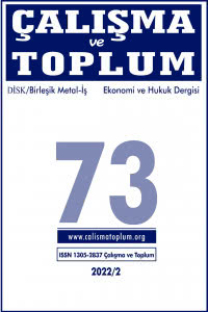Control Regimes on Mobile Working Labor Process: The Case of Turkish Telecommunication Industry
Mobil Çalışma Emek Süreci Üzerindeki Kontrol Rejimleri: Türkiye Telekomünikasyon Sanayi Örneği
___
Barker, J. R. (1993) “Tightening the Iron Cage: Concertive Control in Self- Managing Teams”, Administrative Science Quarterly, 38: 408-437.Boutang, Y. M. (2011) Cognitive Capitalism, UK: Polity Press.
Braverman, H., (1974) Labor and Monopoly Capital: The Degradation of Work in the Twentieth Century. NY: Monthly Review Press.
Chartered Institute of Ergonomics and Human Factors (2017) “Mobile Working Risk Management System”, Guide Book, UK: Chartered Institute of Ergonomics and Human Factors https://www.ergonomics.org.uk/Public/Resources/Publications/Mobile_ Working.aspx (01.08. 2018).
Edwards, R. (1979) Contested Terrain: The Transformation of the Workplace in the Twentieth Century, London: Heinemann.
Elgar, T. (1979) “Valorisation and ‘Deskilling’: A Critique of Braverman”, Capital & Class, Spring, 3(1): 58-99.
Ercan, F.Yusufi-Yılmaz, F. and Gültekin-Karakaş, D. (2016) “Yeni Türkiye”nin Değişen Devlet ve Sermaye İlişkilerini Teşvik Politikaları Üzerinden Okumak, In:“Yeni” Türkiye? Kapitalizm, Devlet, Sınıflar (eds.). T.Tören and M.Kutun, Istanbul:SAV Publications, pp.128-205.
Felstead, A. Jewson, N. and Walters, S. (2005) Changing Places of Work, London: Sage.
Fuchs, C. (2012) “Some Reflections on Manuel Castells’ Book ‘Networks of Outrage and Hope. Social Movements in the Internet Age’ ”, Triple C-Journal for a Global Sustainable Information Society, 10(2): 775-797.
Huws, U. (2006) The Transformation of Work in a Global Knowledge Economy: Towards a Conceptual Framework, Workpackage 3: Theories and concepts. EU WORKS project, Project number: CIT3-CT-2005-006193.
IBM Business Consulting Services (2005) The Mobile Working Experience - A European Perspective, USA.
Knights, D. and Willmott, H. (1990) Labor Process Theory, UK: Palgrave Macmillan.
Littler, C. (1990) “The Labour Process Debate: A Theoretical Review 1974-1988”, In: Labour Process Theory (eds.) D. Knights and H. Willmott, London: Macmillan.
Lowry, D. and Moskos, M. (2005) “Hanging on the Mobile Phone: Experiencing Work and Spatial Flexibility”, National Institute of Labor Studies Working Paper 153, Flinders University, Australia. http://socio.ch/mobile/lowry_moskos.pdf
Marx, K. (1976), Capital-I, Translated by B. Fowkes, London: Penguin.
Marx, K. and Engels, F. (1989) Marx & Engels Collected Works Vol 32: Marx: 1861-1863. London: Lawrence & Wishart.
Palloix, C. (1976) “The Labor Process from Fordism to Neo Fordism”, In: The Labor Process & Class Strategies, Conference of Socialist Economies Pamphlet No.1, London, pp.46-67.
Raju, D. J. (2012) “Reconceptualizing Capitalism: Forms of Subsumption of Labor, Class Struggle and Uneven Development”, Review of Radical Political Economics, 44(2):178-200.
Read, J.(2003) The Micro-politics of Capital: Marx and the Prehistory of the Present, Albany: State University of New York Press.
Republic of Turkey Ministry of Development (2015) Information Society Strategy and Action Plan of Turkey -2015-2018– issued Official Gazette dated 06.03.2015.
Richman, A., Noble, K., & Johnson, A. (2002). When the Workplace is Many Places. The Extent and Nature of Off-site Work Today. Watertown, MA: WFD Consulting Inc.
Sewell, G. (1998) “The Discipline of Teams: The Control of Team -Based Industrial Work through Electronic and Peer Surveillance”, Special Issue: Critical Perspectives on Organizational Control, Administrative Science Quarterly, 43(2): 397-428.
Shalla, V. and Clement W. (eds.) (2007) Work In Tumultuous Times: Critical Perspectives. Montreal: McGill-Queens University Press.
Thompson, P. (1990) “Crawling From the Wreckage: The Labour Process and the Politics of Production”, In: LabourProcessTheory (eds.) D. Knights and H. Willmott, London: Macmillan.
Thompson, P. and Smith, C. (2009) “Labour Power and Labour Process: Contesting the Marginality of the Sociology of Work”, Sociology, 43(5): 913-930.
Tunçalp, D., Yıldırım, N. Ercan, F. and Gültekin -Karakaş, D. (2015) “Decentralized Workplace and Mobile Labour: Re-shaping Labour Process in Mobile Telecom Operators”, EGOS – European Group of Organizational Studies Colloquium, July 2–5, Athens, Greece.
Vercellone, C. (2007) “From Formal Subsumption to General Intellect: Elements for a Marxist Reading of the Thesis of Cognitive Capitalism”, Historical Materialism, 15 (1): 13-36.
Wajcman,J., Bittman, M., Jones, P., Johnstone, L., Brown, J. (2007) The Impact of the Mobile Phone on Work/Life Balance, Preliminary Report, January, Australia: Australian Research Council.
Wheelen, T. L. and Hunger, J. D. 2008. Strategic Management and Business Policy, Pearson Publishing.
YASED (International Investor Association) (2012) 2023 Hedefleri Yolunda Bilgi ve İletişim Teknolojileri, September.
Yıldırım, N. and Ansal H. (2013) "Mobile Working: The Case of ICT Professionals in Turkey", 22nd International Conference on Management of Technology IAMOT 2013 Proceedings, Porto Alegre, Brasil, April.
Yıldırım, N. and Ansal, H. (2014) “How Do Mobile Technologies Affect Work and Private Lives? The case of Turkish Banking Professionals”, The Proceedings of PICMET’14 –Conference. 2014, Paper Nr. 14R0136, July 27-31, Kanazawa, Japan.
Yıldırım, N., Tunçalp, D. and Ansal, H. (2014) “Et tu, Mobilité? Job Content and Perceived Organizational Control in the Mobile Work of Mobile Operator Employees”, The Proceedings of EGOS – European Group of Organizational Studies, July 3–5, Rotterdam, The Netherlands.
- ISSN: 1305-2837
- Yayın Aralığı: Yılda 4 Sayı
- Başlangıç: 2003
- Yayıncı: DİSK Birleşik Metal-İş
İşe İade Davalarında Arabuluculuk
Zonguldak Madencilerinin Sorunlarına Yönelik Sendikal Basının Katkıları: İşçi Sendikası Örneği
İşçilerin Kütüphanesi: Türkiye’de Sendikalı İşçilerin Entelektüel Kaynakları (1946-1961)
Türkiye’de Kadın Göçmen İşçilerin Durumunun ‘Emek-Sermaye Çatışmasında’ Yeniden Değerlendirilmesi
Mobil Çalışma Emek Süreci Üzerindeki Kontrol Rejimleri: Türkiye Telekomünikasyon Sanayi Örneği
Nihan YILDIRIM, Derya GÜLTEKİN KARAKAŞ, Fuat ERCAN
Sayım YORGUN, MELTEM DELEN, HAKAN BEKTAŞ
Özgürlük Arayışında “Mecbur İnsan” Olmak: Denizli İşgücü Piyasasında İranlı Mülteciler
Aslıcan KALFA-TOPATEŞ, Hakan TOPATEŞ, Nursel DURMAZ
İşçilerin Kütüphanesi: Türkiye’de Sendikalı İşçilerin Entelektüel Kaynakları 1946-1961
Şantiyelerde Çalışan Teknik Elemanların Çalışma Koşulları Üzerine Bir Alan Çalışması
